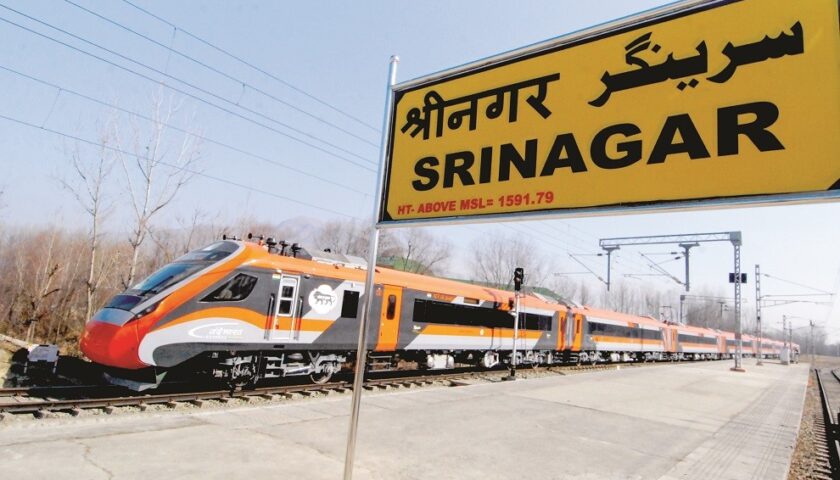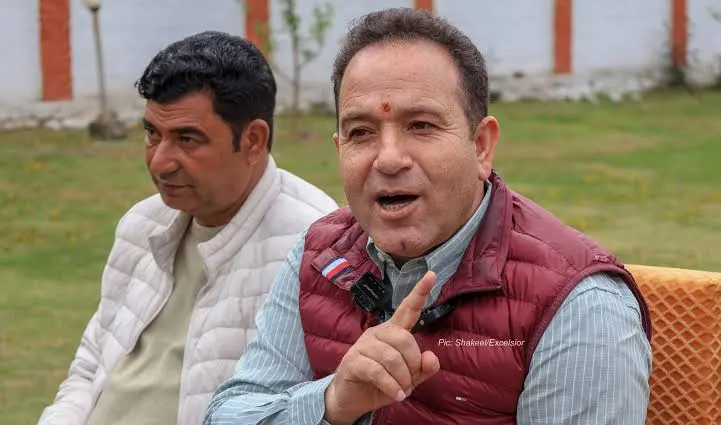When the Goods and Services Tax (GST) was extended to Jammu & Kashmir a week after it was implemented in the rest of the country, it was widely seen as marking the end of the state’s fiscal autonomy, and a step towards the abrogation of its special status. While the opposition National Conference (NC) described the extension of the law, through an executive Order by the President under Article 370, as an “impingement into J&K’s special status and violation of Article 370”, the Peoples Democratic Party (PDP), which is in power in coalition with the BJP, viewed it completely differently.
Senior leader and state Public Works Minister Nayeem Akhtar called it “the biggest internal confidence building measure (CBM) from the Centre”. Two riders had been incorporated into the Presidential Order — the first time this had happened, Akhtar said. “The message is clear: you (J&K) have a special position in the Union which we have agreed in the agenda of alliance (between the PDP and BJP) and now we have shown that we are committed to protect this special status.”
The two riders are: (i) the J&K government’s concurrence is mandatory for any decision taken by the GST Council that impinges on the constitutional provisions relating to the state, and (ii) J&K’s powers to legislate under Section 5 of the Constitution of J&K remain unaffected.
“(The Presidential Order extending GST to J&K) is more a political document than a mere legal order” to extend a new law to the state, Akhtar said. “It is a reiteration from the President of India that we won’t do anything to weaken Article 370. There have been 47 such Orders earlier, and none has had such explicit safeguards for our special status.”
The PDP’s interpretation of the President’s Order to extend GST to J&K is, however, contradicted by the stand, or lack thereof, taken by the Centre in an ongoing case in the Supreme Court, challenging the validity of Article 35A of the Constitution. This provision, which empowers the J&K legislature to define “permanent residents” of the state, was added to Article 35 through a Presidential Order called The Constitution (Application to Jammu and Kashmir) Order 1954, issued under Article 370. The order superseded an earlier order issued in 1950, which provided the framework for division of powers between J&K and New Delhi under Article 370.
The RSS and BJP are opposed to Article 35A because it bars non-J&K state subjects to settle and buy property in J&K. Sangh groups are unanimous that the only way to permanently end the Kashmir dispute is to alter its demography by settling people from outside the state, with the right to acquire land and property, and vote in the Assembly elections. The BJP manifesto for the Assembly elections had promised “land at cheap rates for establishment of sainik colonies in major towns” for retired soldiers to settle in.
In 2014, a little known NGO called We the Citizens filed a writ petition seeking the striking down of Article 35 A. While the J&K government filed a counter-affidavit, the union government did not — despite pleas from the state government, especially the PDP. The Centre’s silence is being read in Kashmir as “a continuation of the process to end J&K’s special status” in the Constitution.
“We were hopeful that the Centre will take a clear view (in the SC) on the issue (challenge to Article 35A) especially after the recent Presidential Order (on GST) where it was reasserted in unequivocal terms that J&K’s special status will be protected,” Akhtar said. “The Permanent Resident Act forms the core of J&K’s special status within the Union. If it is removed, there will be nothing left to our special status.”
The National Conference has described the Centre’s refusal to take a stand on Article 35A as “yet another machination” (against J&K’s special status) “after the GST wound”. On July 17, Attorney General K K Venugopal told a Bench of Chief Justice J S Khehar and Justice D Y Chandrachud that the petition against Article 35A raised “very sensitive” questions that required a “larger debate”, following which the court referred the matter to a three-judge Bench and set six weeks for final disposal. This, the NC statement said, “has raised many red flags and yet again points towards the fact that the powers that be in New Delhi are patronising and supporting such moves to question J&K’s special status and state subject laws”.
But what does the extension of the GST Act to J&K mean?
The PDP’s spin notwithstanding, it is clear that J&K’s special status has been encroached upon. Former state Finance Minister and former chairman of the Empowered Committee of State Finance Ministers on GST, Abdul Rahim Rather, said, “While the authority of the Centre to levy tax derives from Article 246 (of the Indian Constitution), which divides such power between the Centre and the states, J&K derives its power to levy taxes from the J&K Constitution. Now that has completely gone.”
According to Rather, the “so called safeguards in the Presidential Order (on GST) are “hogwash, and mean nothing tangibly”. He said, “The riders (to safeguard J&K’s special status) they (PDP) are talking about mean nothing. Our power to levy tax has gone to the Centre. The GST Council does not have to decide on anything affecting special status, and the promise of taking the Article 370 route if such an occasion arises, is ridiculous.”
Also, Rather said, “It doesn’t mean anything to say that Section 5 of the J&K Constitution will remain unaffected. The power to levy tax in addition to GST is no power. Other states too have that power.” The PDP’s coalition partner, BJP has described the extension of GST as “J&K’s financial integration” and a beginning of the process of complete merger of the state with the Union — in a way, agreeing with the NC.
The Presidential Order of 1954 provided the framework for the division of powers between J&K and the Centre under Article 370. All subsequent Presidential Orders, including the one extending GST to J&K, were modifications of the 1954 original. If, in the Article 35A case, the Supreme Court strikes down the 1954 Order on the ground — as argued by the petitioner — that Parliament had not passed it, it would have serious implications for all subsequent Presidential Orders.
This is a double-edged sword: no constitutional amendment vis-à-vis J&K can be carried out through Article 368 (which describes Parliament’s power to amend the Constitution); it is possible only through a Presidential Order issued under Article 370, but with the concurrence of the state government and ratification by the J&K Constituent Assembly, which has ceased to exist since 1956. (In fact, the legality of every such Order issued after 1956 is questionable because they lack the Constituent Assembly’s ratification.) The Centre has, however, used Presidential Orders under Article 370 repeatedly to erode the autonomy that this constitutional provision was supposed to provide to J&K.
There is no constitutional way to remove Article 370, especially because Article 1 of the Indian Constitution (name and territory of the Union) is applicable to J&K only through Article 370. But if the challenge to the constitutionality of the 1954 Order is successful, all subsequent Presidential Orders will stand automatically invalidated. The residents of J&K were deemed as Indian citizens through these Orders; they were used to extend 94 out of 97 entries in the Union List, and 260 out of 395 Articles of the Indian Constitution, to J&K; and to impose central rule in J&K.
GST, Article 35A and Special status: A complex story unfolds in J&K




